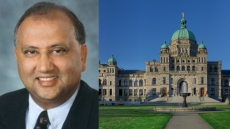OTTAWA — Canada's transport minister quietly wrote to the heads of every major airline in the country earlier this year to try and stamp out a practice where parents were being seated separately from their children on flights.
In the March letter, Lisa Raitt called the issue one "where logic should prevail" and encouraged the airlines to ensure parents were seated with their young children whenever possible.
She asked the airlines to come up with some way to eliminate such incidents, provide "greater predictability" to parents and "minimize the challenges that parents face when they embark on air travel with children."
A briefing note accompanying the letter suggests the missive wasn't intended to signal that the federal government was going to legislate an end to the practice by airlines, but to promote what Raitt's officials called "an industry-led solution to avoid such situations."
Still, Transport Canada officials wrote in the briefing note that they were "exploring opportunities to address this issue and input from air carriers would be useful in that regard."
A copy of the letter and briefing note were obtained by The Canadian Press under the Access to Information Act.
There are no federal rules requiring parents to be seated next to their children on flights, nor is it a guarantee under airline policy that a parent or guardian will automatically get a seat next to children under age 12.
In dismissing a complaint against six airlines, the Canadian Transport Agency ruled late last year that ticketing rules that don't guarantee adjoining seats for parents and their children were neither unreasonable nor discriminatory.
The problem may be a result of how passengers can select their seats.
Some airlines charge a seat-selection fee on lower-fare tickets at the time of purchase — a practice "typical of an industry where margins are thin" and carriers are looking for extra revenue without raising ticket prices, the briefing note says.
Some passengers may not pay the fee, instead hoping to pick their seats when they check in, putting them in competition with other passengers in the "first-come, first-served" race for seats, the note says.
Air Canada, Porter, WestJet and Sunwing all said their existing policies have worked well to limit the number of times parents are seated separately from their children.
Sunwing, for instance, holds back a "certain number of seats" so that minors can sit adjacent to their parents during flights. WestJet said 96 per cent of children under 12 booked on its flights end up sitting with their parents.
If families are seated in different spots, the airlines said crew members look for open seats and ask other passengers to voluntarily relocate so that families can stay together on flights.
"The airlines try to accommodate parents and children when embarking, but that entirely depends on other passengers' willingness to accommodate the parents and children," said John McKenna, president and CEO of the Air Transport Association of Canada, which represents many smaller carriers.
"Not very many people are willing to give up either an aisle or window seat for a middle seat."
McKenna said there was a "regulatory or legislative solution" to the issue. Parents, he said, should either book as early as possible when there are more seats available on a flight, or pay a seat-selection fee.




